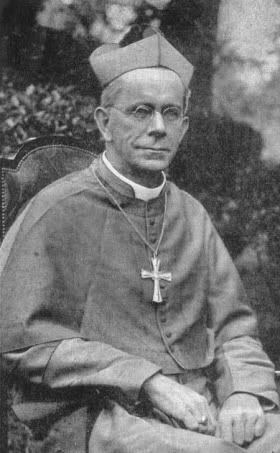
The Rt Rev'd Frank Weston, Lord Bishop of Zanzibar
Sidney Dark wrote a forward to Weston's speech "Our Present Duty" in which he noted: "I think it would be safe to say that the speech with which the late Bishop of Zanzibar concluded the Anglo-Catholic Congress in 1923 was the most eloquent, the most moving, and the most exalted religious message delivered in London by a highly placed ecclesiastic in this generation. Dr. Frank Weston was a man of many great parts. In scholarship he had few equals among his episcopal brethren. He was a man of great force of character, certain to dominate any assembly of which he was a member. This was shown at the Lambeth Conference in 1921 when, as the late Dr. Watts-Ditchfield so generously admitted, he was one of the three or four bishops whose direct personal influence affected the assembly. His power over his fellows was due to a rare combination of character and intellect. We who were present at the Albert Hall on those blazing hot days in the Summer of 1923 had our own experience of the magnetic power of Dr. Weston’s personality."
On that occasion, Weston said, "I want you to make your stand for the Tabernacle, not for your own sakes but for the sake of truth first, and in the second place for the sake of reunion hereafter. But for the truth, because the one great thing that England needs to learn is that Christ is found in and amid matter—Spirit through matter—God in flesh, God in the Sacrament. But I say to you, and I say it to you with all the earnestness that I have, that if you are prepared to fight for the right of adoring Jesus in his Blessed Sacrament, then you have got to come out from before your Tabernacle and walk, with Christ mystically present in you, out into the streets of this country, and find the same Jesus in the people of your cities and your villages. You cannot claim to worship Jesus in the Tabernacle, if you do not pity Jesus in the slum. . . . I am talking the Gospel, and I say to you this: If you are Christians then your Jesus is one and the same: Jesus on the Throne of his glory, Jesus in the Blessed Sacrament, Jesus received into your hearts in Communion, Jesus with you mystically as you pray, and Jesus enthroned in the hearts and bodies of his brothers and sisters up and down this country. And it is folly—it is madness—to suppose that you can worship Jesus in the Sacraments and Jesus on the Throne of glory, when you are sweating him in the souls and bodies of his children."
Also, in the open leter "Ecclesia Anglicana: For What Does She Stand?" to the Bishop of St Alban's in 1914, Weston wrote: "All this, of course, is quite admirable in spite of the anomalous position of the Bishop, so long as the Ecclesia Anglicana knows her own mind. But if once the Church at the base gets into any difficulties of self-expression, the missionaries at the front are practically giving their lives to a lost cause. . . . For myself I gain no comfort from [these difficulties of self-expression]. A mediating Church, it seems to me, would not include within its borders two men of directly contradictory beliefs: rather it would so modify and adjust the two beliefs until they were seen to be complementary, and then it would help one man to hold them both. . . . The Ecclesia Anglicana claims to be the Catholic Church in England, and to recall her to her true witness requires more than one voice. We cannot shew a united front against Modernism, our most deadly danger, unless we at the same time declare ourselves true to our own position."


No comments:
Post a Comment